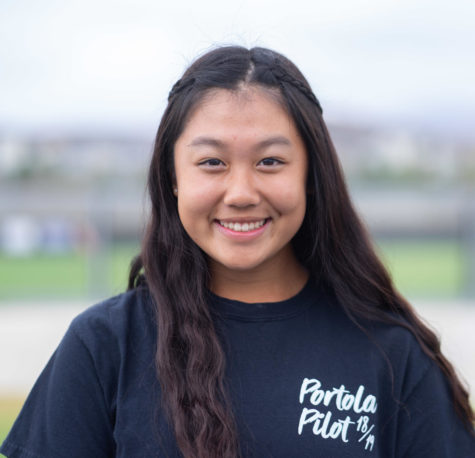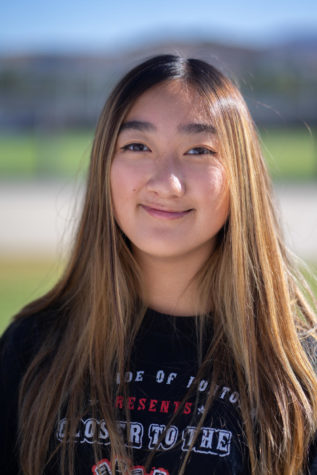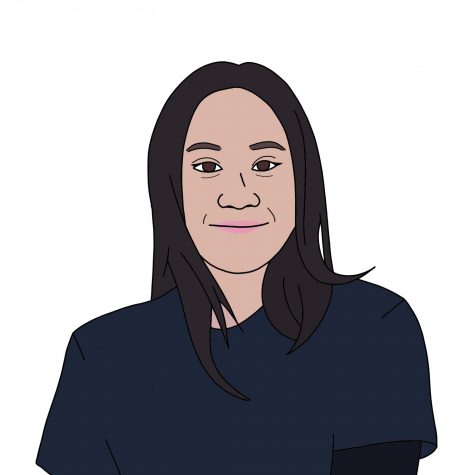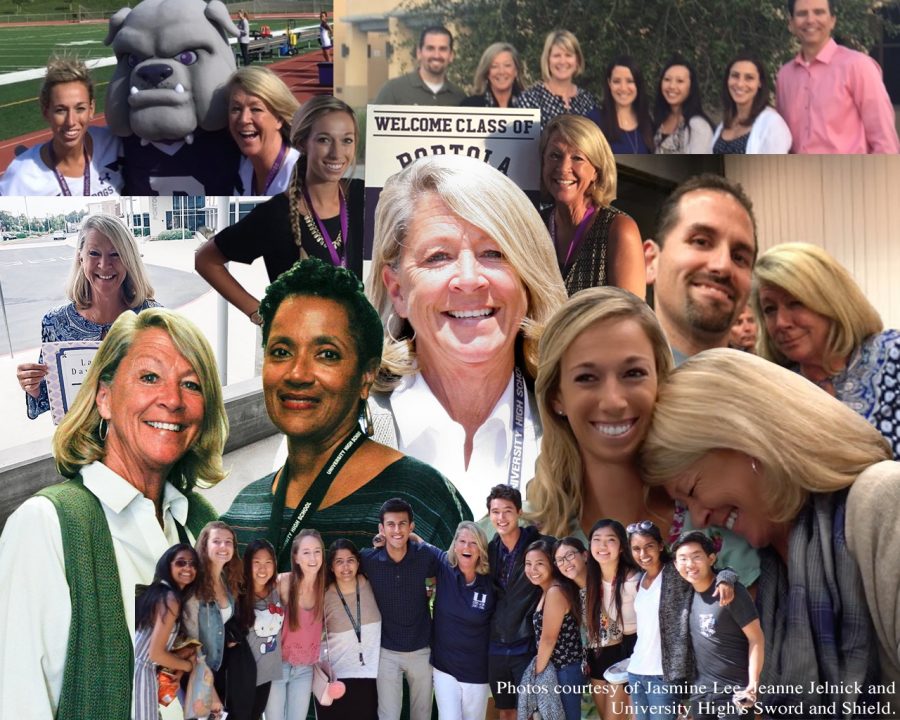Thank You, Momma J
Literary and language arts teacher Jeanne Jelnick, also lovingly known as “Momma J” by students and staff alike, has taught high school students for several decades at University High and Portola High. Throughout her career, she has been recognized for her dedication to education, having made a home for students in her classroom.
As we speak with literary and language arts teacher Jeanne Jelnick, known as “Momma J” to the Portola High community, her eyes often gaze into the distance, staring fondly at memories and experiences we cannot see from behind our screens. But when she eagerly asks how we’ve been, the warmth in her bright eyes is as clear as day; it’s easy to imagine that she’s right in front of us.
Here, we can pretend that we aren’t confined to the safety of our homes. Instead, we are sitting in the comfort of Jelnick’s classroom, decorated with student-made Greek masks and a copy of “The School of Athens” among other artwork on the walls. And, as her anecdotes from her years as a teacher begin to tumble out one after another, her voice as a storyteller shines through.
Jelnick’s passion for education grew from a young age, but when we ask her why she loves being a high school educator, the smile that students know to be distinctively hers brings light into our conversation as she delves into her love for teaching at the secondary level.
“I always wanted to be a teacher; I played school when I was little,” Jelnick said. “I just feel, and I’ve said this to my students, that teenagers are the most fascinating and wonderful people to spend many hours a day with because they say what they mean, they are all about fairness in a world that’s not fair, they want what is best for everything. I think there’s a particular need that teenagers have that I feel very equipped to serve. Teenagers are bright. They can read; they can write; they want to debate and discuss. It’s intellectually engaging.”
Although she knew that she was always meant to teach, she had momentary thoughts about pursuing alternate careers and wondered if she was intended for a different role in serving others. However, her love of teaching teenagers remained, and her place in high school education persisted.
“I hit a point that, not that I believed I had taken the wrong path, but that I felt that maybe this wasn’t the path that I should continue,” Jelnick said. “I considered early on, when I was really active with at-risk kids, getting a degree in counseling… but after I had my three kids, I started getting involved in some work at UCI that was really wonderful, and I thought about going to post-secondary education work, but I didn’t really want to do that because I knew that I would miss you, literally miss the adolescence, the teenagers. I didn’t want to go away from that, so what I decided to do was explore other ways to make my professional life exciting and new and fresh.”
As a staff member at Portola High, Jelnick has been able to intertwine those side interests and apply them to teaching literature to her students. Jelnick initially majored in theater and worked professionally in theater before going back to school to study literature. As a result, her experience was helpful both as a language arts educator and as a theater director, which she took on during the 2018-19 school year.
“I think what I love about theater is the literature,” Jelnick said. “So, I took that detour, and it was fun, but I knew I would always end up in the classroom, which is a great place for someone who loves theater. Teaching literature means you’re teaching drama. It means you have to perform, you have to use your energy and your voice, so all of the skills that I developed in theater I think served me in the classroom.”
Jelnick’s role as a founding Portola High staff member served as a new beginning for her already extensive career, and it allowed her to build upon what she had learned from teaching at University High, where she served as both an ASB adviser and literary and language arts teacher for 33 years. It was at University High where her students in ASB began calling her “Momma J,” as well.
“I was just excited because [Portola High] was so new and there was so much possibility…You teach for 35 years, you see where things have gone wrong, and you want to fix them, but it’s hard to fix. So much of what happens is so entrenched in a system,” Jelnick said. “This was an opportunity where I came walking in the classroom and thinking, ‘I am not going to do anything the way I have done it before. I am going to do it the way I know these kids need it to be done.’”
Jelnick’s continuously evolving teaching philosophy in order to adapt to each unique generation of students focuses on the concept of learner’s choice and making sure that curriculum revolves around the student, not the teacher.
“I do think I had a kind of strong maternal love for your class, particularly,” Jelnick said. “I think I had always felt this way about this class. This first class, these babies, I’m gonna take care of them. I’m gonna make sure they’re okay, I’m gonna make sure that Portola is a good place for these kids for four years, and maybe my legacy will continue.”
From Portola High’s first ever day of school, Jelnick made it clear that she would graduate alongside the class of 2020.
“There are some traditions and rituals that retirees experience —just as seniors do— before they transition into their next chapter. We have lost that scaffolding. The most significant of them is you,” Jelnick said. “I didn’t know that my last day teaching was my last day teaching. I would say that I feel a kind of connection to you, because in a way I’m feeling the same thing you’re feeling. It’s getting harder as we get closer, in a way, to let go.”
Her voice is thick with emotion and grief. Our throats close at the realization that Jelnick, too, has ended her time at Portola High abruptly and without time to properly say goodbye — that she shares a sense of kinship with us.
She pauses, and we take the momentary silence to wipe tears from our eyes before they fall.
When she continues, we can see a hundred different thoughts and emotions swirling in her eyes: loss, yes, and nostalgia as well, but also optimism and hope.
“This is the advice I would give to any one of you: ‘there are no wrong turnings. Only paths we had not known we were meant to walk,’” Jelnick said. “I’ve been quoting that a bucket load with my seniors who didn’t know which school to pick, didn’t know which to commit to, applied to the wrong school, didn’t get in. There are no wrong turnings — you just have to accept that.”
Jelnick says she plans on taking care of her grandson, Emmett Newton, in order to help her daughter, science teacher Jeralyn Newton, transition back into teaching in the fall. And, of course, Jelnick foresees writing to be an important part of the next several years of her life, from tutoring students to potentially writing her own books and plays.
Before we end the conference, we promise to visit her soon. Although we know that the future is tremendously uncertain at this time, we also know that Momma J will always be someone we can lean on, trust and love wholeheartedly. Whether it be in a few days, two weeks after graduation or halfway through July, we are confident we will see her again.
“I’m very, very attached to you, the class of 2020. I always have been, and then this happened,” Jelnick said. “We are right here, together, figuring this out. I don’t know when I’m ever gonna get to hug you guys again, but I know I will. That’s the thing — I’m a hugger.”
Your donation will support the student journalists of Portola High School. Your contribution will allow us to purchase equipment and cover our annual website hosting costs.

Helena Hu is the Co-Editor-in-Chief of the Portola Pilot this year. As Centerspread Editor and Social Media Director for the past two years respectively,...

Annie Qiao is your 2019-20 Arts & Entertainment Editor for her fourth year at the Pilot! As a passionate admirer of the arts, she hopes to bring a...

Kelthie Truong is a Co-Managing Editor for the 2020-21 school year, her second and final year with the Pilot. When she’s not in the newsroom, you can...




